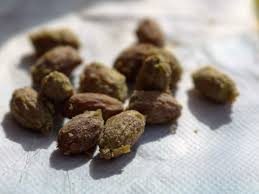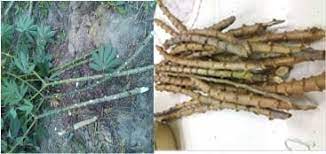Olive Pit: Economic Importance, Uses, and By-Products
Olive pit, also known as an olive stone or seed, is the hard, woody structure found at the center of an olive fruit. It is roughly spherical or ellipsoid in shape and is typically about 1 to 2 centimeters in length, depending on the variety of olive. The pit is often surrounded by the edible part of the olive, known as the pulp or flesh. The olive pit is hard, tough, and dense, making it difficult to crack open without specialized equipment.
The pit is typically oval or rounded in shape and varies in size based on the olive variety. It’s about the size of a large pea or small grape. The pit serves as a protective layer for the seed within, guarding it from external damage or environmental conditions. Inside the pit is the actual olive seed, which, under the right conditions, can sprout and grow into a new olive tree.
The surface of the pit is generally smooth but may have some irregularities or creases. The pit is not edible due to its hardness and woody nature. However, it can be used to propagate new olive trees. In commercial olive processing, the pits are removed to produce pitted olives. This is often done by crushing or pressing the olive to separate the pit from the flesh.
Olive pits have historically been used for various purposes, including as fuel for fires and heating, and more recently for sustainable energy production. Additionally, they have been utilized in the cosmetic and skincare industry for their exfoliating properties.
The Economic Importance and Uses ofOlive Pit/Stone

Olive pits, also known as olive stones or seeds, have several economic and practical uses beyond just being a byproduct of olive processing.
Here are some of the economic importance and uses of olive pits:
1. Biofuel Production: Olives pits can be used to produce biofuels, such as olives pit charcoal or biomass pellets. These biofuels can be utilized for heating, cooking, and even electricity generation. The carbon-rich composition of olive pits makes them suitable for bioenergy production.
2. Soil Amendment and Fertilizer: Ground olive pits can be used as a soil amendment to improve soil structure, water retention, and fertility. They provide organic matter and essential nutrients to the soil, enhancing plant growth and agricultural productivity.
3. Activated Carbon Production: Olives pits can be converted into activated carbon through a carbonization process. Activated carbon is widely used in water and air purification, gas adsorption, and wastewater treatment due to its excellent adsorption properties.
4. Animal Bedding: Ground olive pits can be used as animal bedding, especially for poultry and livestock. This use provides a comfortable bedding material and helps manage waste in animal facilities.
5. Agricultural and Horticultural Use: Olive pits can be used as a mulching material to control weed growth, retain soil moisture, and regulate soil temperature. They can also be used for landscaping purposes, including pathways and ground cover.
6. Artisanal Crafts and Decorations: Olive pits can be carved or used in crafts to create decorative items, jewelry, buttons, or ornamental pieces. Artisans often utilize olive pits for their unique texture and aesthetic appeal.
Read Also: Olive Pulp: Economic Importance, Uses, and By-Products
7. Waste-to-Energy: Some facilities use olives pits, along with other agricultural waste, in biomass power plants to generate electricity. This practice contributes to renewable energy production and waste reduction.
8. Medicinal and Pharmaceutical Uses: Certain compounds extracted from olive pits have potential medicinal properties. These compounds can be used in the pharmaceutical industry for various health applications, such as antioxidants or antimicrobial agents.
9. Composite Materials: Ground olives pits can be used in the production of composite materials, providing reinforcement and reducing the use of other materials. This application is particularly relevant in the automotive and construction industries.
10. Food Industry: Olives pits can be ground and used as a filler or additive in some food products, including animal feed. The pits’ composition can add fiber and bulk to the product.
11. Erosion Control and Landscaping: Olives pits can be used in erosion control measures to stabilize soil on slopes, embankments, and construction sites. They help prevent soil erosion and promote vegetation growth.
The Products and By-products That Can Be Derived From Olive Pit/Stone
Olive pits or stones, which are the hard, woody inner part of olives, can be repurposed to create various products and by-products through different processes.
Here’s a list and explanation of some potential products and by-products derived from olive pits:
1. Olive Pit Oil (Olive Stone Oil): Olives pits can be pressed to extract olive pit oil, a type of oil similar to olive oil but derived from the pits. This oil can be used for cooking and as a base for certain cosmetics.
2. Activated Carbon: Olive pits can be carbonized and activated to produce activated carbon, which is widely used in water and air purification due to its high adsorption capacity.
3. Biomass Fuel: Olives pits can be used as a biomass fuel source for heating, cooking, and even for generating electricity. The pits can be burned directly or converted into charcoal.
4. Charcoal: Olivse pits can be carbonized to produce charcoal, which has applications in cooking, grilling, water purification, and as an art material (charcoal drawing).
Read Also: Olive Fruit: Economic Importance, Uses And By-Products
5. Biochar: Olives pits can be converted into biochar, a type of charcoal used to enhance soil fertility, retain moisture, and sequester carbon when added to agricultural soil.
6. Powdered Olive Pit: Olive spits can be ground into a fine powder and used in various applications, such as natural exfoliants in cosmetic products, fertilizers, or even as an additive in animal feed.
7. Olive Pit Mulch: Ground olives pits can be used as mulch in gardens and agricultural fields to improve soil structure, moisture retention, and prevent weed growth.
8. Olive Pit Ash: After burning, the ash derived from olives pits can be used as a mineral-rich additive for soil conditioning or in making soap.
9. Biodegradable Plastics: Olives pits can be used as a source of bio-based material for producing biodegradable plastics, contributing to sustainable packaging solutions.
10. Construction Material: Ground olives pits can be mixed with other materials to create construction blocks, boards, or composites, providing a sustainable alternative in the construction industry.
11. Cosmetic and Skincare Products: Olives pit oil and olive pit powder can be used in cosmetic and skincare products like scrubs, soaps, and creams due to their exfoliating and moisturizing properties.
In conclusion, important to note that the viability and suitability of these products and by-products may vary based on the specific processing methods, regional availability, and intended applications. Additionally, environmental and sustainability considerations should be taken into account when exploring the potential uses of olive pits.
Read Also: Micro Farming: Comprehensive Guide and Benefits









